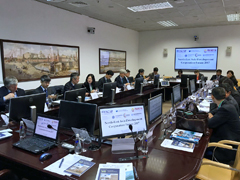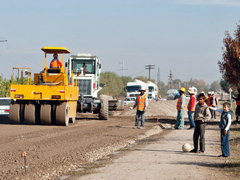Kitano Discusses SDGs Engagement by China, Japan, Russia and South Korea at the North-East Asia Development Cooperation Forum
2017.11.06
Researchers and practitioners from Japan, China, South Korea and Russia gathered in Russia’s capital city Moscow on Sept. 27 and 28, 2017, to participate in the fourth North-East Asia Development Cooperation Forum. A common point between these four countries is that they have experienced both receiving and providing developmental assistance. The Forum was organized in 2014 as an initiative of the East and North-East Asia Office of the United Nations Economic and Social Commission for Asia and the Pacific (UN-ESCAP) as a platform for sharing knowledge and discussing the possibilities of cooperation based on their experience.
In addition to China, Japan, South Korea and Russia, participants from Central Asia and Mongolia were also invited, and they addressed the interrelationship between sustainable development and sustainable peace in Eurasia and the link between development cooperation and security problems. Specifically, discussions in Session 1 focused on "Securing development in greater Eurasia," Session 2 focused on "Development cooperation to strengthen resilience," Session 3 focused on "North-East Asia partnership for implementing SDGs" and Session 4 focused on "Academic collaboration in the field of development cooperation." JICA Research Institute Director Naohiro Kitano and Senior Research Fellow Hiroaki Shiga participated.

Researchers and practitioners shared their knowledge each other(Photo:UN-ESCAP)
In Session 1, Shiga gave a presentation on the similarities and differences in development assistance provided by Russia and Japan in Central Asia. Shiga explained that, straddling both Europe and Asia, Russia is a unique donor for geographical reasons. It is also unique for historical reasons; it went from an aid-giving country to an aid-receiving country, and is now once again in the process of becoming a major donor country. Russia differs from other emerging donors such as China, India, and Brazil in that it does not advocate south-south cooperation. He also said aid from Japan and Russia shares an emphasis on poverty reduction and respect for the self-reliance and ownership of aid-receiving countries. Japan and Russia complement each other in their differing approaches to establish stability in Central Asia. Shiga concluded his presentation by stating that Russia's abundant knowledge and experience in Central Asia will serve as a reference for Japan's ODA in that region.
In Session 3, Kitano gave a presentation on "North-East Asian Development Finance toward Achieving SDGs," in which he introduced the efforts of Japan, China, South Korea and Russia to address the SDGs, as well as the volume of aid provided by the four countries, based on the most recent findings of his own research. In regard to the cooperative relationship of the four countries, Kitano also showed that JICA-supported port projects and China-supported railway projects had been incorporated in the Master Plan for the Northern Economic Corridor in Kenya and Uganda as well, in addition to JICA and AIIB (joint financing with ADB) projects being placed in the framework of the Central Asia Regional Economic Cooperation (CAREC).
During the Forum, Russian representatives explained about Russia's development assistance, which had not been clear in the past. In that context, participants discussed similarities and differences between the aid policies of the four countries. Common features among the four countries include the adoption of approaches that respect the ownership of the aid-receiving countries and the view that it is necessary to continue exchanging opinions and information and deepen cooperative relationships in the future as well.

JICA supports the repair of roads in Tajikistan(Photo:JICA/Shinichi Kuno)
Presentation material

事業事前評価表(地球規模課題対応国際科学技術協力(SATREPS)).国際協力機構 地球環境部 . 防災第一チーム. 1.案件名.国 名: フィリピン共和国.

事業事前評価表(地球規模課題対応国際科学技術協力(SATREPS)).国際協力機構 地球環境部 . 防災第一チーム. 1.案件名.国 名: フィリピン共和国.

事業事前評価表(地球規模課題対応国際科学技術協力(SATREPS)).国際協力機構 地球環境部 . 防災第一チーム. 1.案件名.国 名: フィリピン共和国.

事業事前評価表(地球規模課題対応国際科学技術協力(SATREPS)).国際協力機構 地球環境部 . 防災第一チーム. 1.案件名.国 名: フィリピン共和国.

事業事前評価表(地球規模課題対応国際科学技術協力(SATREPS)).国際協力機構 地球環境部 . 防災第一チーム. 1.案件名.国 名: フィリピン共和国.
scroll